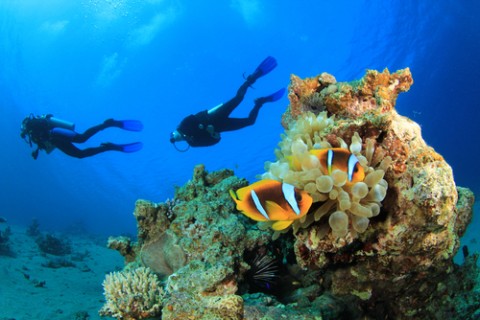Can Scuba Diving Could Be Bad for Your Teeth?
 With winter upon us and many of us planning on jetting off to warmer locales for vacation, a new study published in Science Daily may just add one more item to your pre-travel checklist: a visit to the dentist. If there’s even a chance your vacation could include scuba diving on its itinerary, Dr. Gary Lederman encourages you to have one of your twice-yearly dental exams prior to taking off.
With winter upon us and many of us planning on jetting off to warmer locales for vacation, a new study published in Science Daily may just add one more item to your pre-travel checklist: a visit to the dentist. If there’s even a chance your vacation could include scuba diving on its itinerary, Dr. Gary Lederman encourages you to have one of your twice-yearly dental exams prior to taking off.
According to a recent article published in The British Dental Journal, researchers at the University at Buffalo, in Buffalo, NY found that 41% of scuba divers surveyed reported what they referred to as "dental symptoms" in the water during a dive. These so-called ‘dental symptoms’ ranged from jaw pain to loosened crowns and even cracked teeth!
The cause of these dental symptoms was due to a condition you may not be aware of, called "barodontalgia." Barodontalgia is also known as "tooth squeeze," and is caused when a change in atmospheric pressure causes tooth pain. This not only happens during scuba dives, but it can also happen during hikes, airplane rides, and even just driving to a higher elevation than you are used to.
Another cause of scuba diving related pain is the actual air supply regulator, which divers must hold in their mouth for extended periods of time. This can not only cause pain from forcing the mouth into an awkward position, but it can also cause divers to subconsciously clench their teeth, putting strain on the jaw. The study also found that barodontalgia pain was most often located in the molars- and the higher the level of dive certification, the more frequent and painful the symptoms. Researchers believe this is because the deeper the dive, the greater the pressure, and thus the more severe the pain.
So what can be done to prevent barodontalgia in scuba divers? Well, for one thing, make sure your oral health is in check before you head into deep waters. Take care of any unfilled cavities or loose crowns prior to your dive- and if you are experiencing any discomfort in the jaw from TMJ or other causes, speak to your dentist before attempting a dive. We may be able to treat many issues and ensure the most comfortable dive possible- but in the chance that we cannot, your dentist may advise you to skip the scuba dive and stick to something that will put less pressure on your mouth.
For now, while scuba certification does require a medical exam, it does not require any sort of dental exam, but the authors of the study hope that to change that. For now, it is up to divers to be diligent about their own oral health care- it could save you a lot of pain down the road. After all, as one of the authors of the study says, "One hundred feet underwater is the last place you want to be with a fractured tooth."
If you could use a pre-vacation checkup, give Dr. Lederman’s office a call at 516-882-1764.



